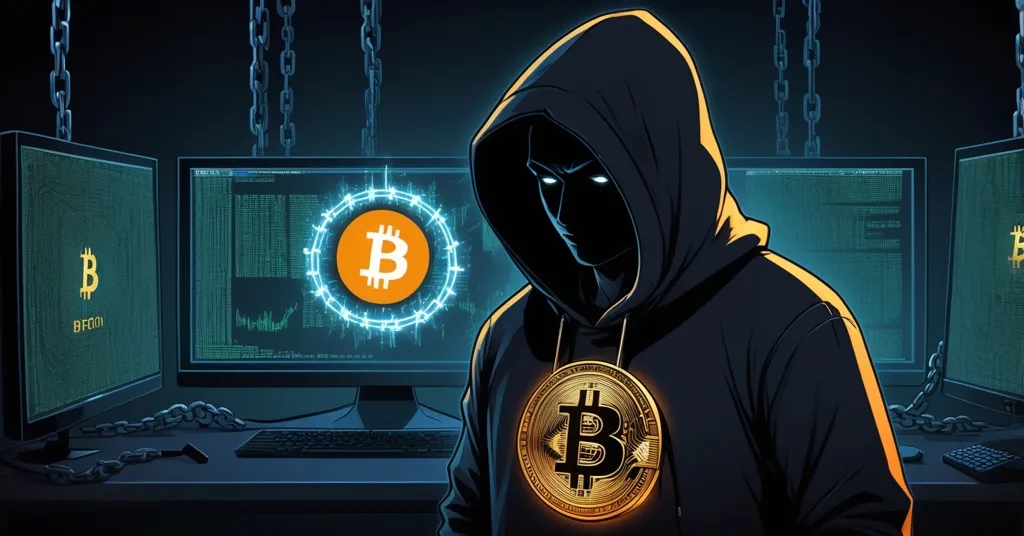Russian Authorities Seize $8.2M in Bitcoin from Hydra Darknet Market Operator

Russian Authorities Seize $8.2 Million in Bitcoin and Crypto from Hydra Darknet Market Chief
Russian law enforcement has delivered a heavy blow to the shadowy world of cryptocurrency crime, confiscating a staggering $8.2 million worth of digital assets from Dmitry Pavlov, a 35-year-old tech operator who confessed to running servers for Hydra, one of the most infamous darknet marketplaces ever. This high-stakes seizure exposes the colossal scale of illicit crypto transactions and the uphill battle authorities face in policing decentralized technologies like Bitcoin.
- Major Seizure: $8.2 million (649 million rubles) in crypto assets seized from Dmitry Pavlov’s wallets.
- Hydra’s Empire: Facilitated over $5 billion in crypto transactions with a $1.7 billion annual turnover at shutdown.
- Russian Darknet Surge: A 68% spike in local darknet crypto sales in 2024, bucking a global decline.
- Regulatory Heat: Cases like Hydra intensify global scrutiny on Bitcoin and cryptocurrency misuse.
Hydra’s Underground Empire: A Darknet Behemoth
Born in 2015, Hydra quickly rose to become the kingpin of darknet marketplaces, a digital black market catering primarily to Russian-speaking users. It was a one-stop shop for everything illegal—drugs, money laundering services, stolen data, you name it. Blockchain analytics firm Chainalysis pegs Hydra’s total crypto transaction volume at over $5 billion across its lifespan. For context, that’s more than the GDP of some small nations, all funneled through the pseudonymity of cryptocurrencies. Unlike traditional cash, crypto offers a layer of privacy where users are identified by wallet addresses rather than real names, though these can sometimes be traced back to individuals with the right tools. For a deeper look into its operations, check out the history of Hydra Market.
At its peak, before being dismantled in 2022 through a joint U.S.-German operation, Hydra’s annual turnover hit $1.7 billion, according to testimony from Russia’s anti-money laundering agency, Rosfinmonitoring. The platform took a cut of 2% to 5% on every deal, raking in obscene profits. An expert estimate puts the net annual haul for Hydra’s co-founders at a staggering 100 billion rubles, roughly $1.3 billion. This wasn’t just a marketplace; it was a full-blown underground economy, exploiting the very decentralization that Bitcoin enthusiasts champion for financial freedom.
Pavlov’s Payday: Running the Digital Underbelly
Enter Dmitry Pavlov, the 35-year-old tech wizard who kept Hydra’s servers humming. His role was critical—managing the digital infrastructure rented from Hetzner, a German hosting company, that allowed Hydra to operate in the shadows. In return, Pavlov was handsomely rewarded. He testified to earning a yearly salary of about 15 million rubles ($189,277) in cryptocurrency, described as “salary and bonuses” for his server wizardry. On top of that, he received monthly cash payments ranging from 1.5 to 2 million rubles ($18,928 to $25,239) for server maintenance costs, often delivered by couriers in bags. Forget crypto airdrops—Pavlov got literal cash drops, straight out of a mob movie. More on the seizure of $8.2M in crypto from Pavlov reveals the scale of his involvement.
Russian investigators eventually tracked down and seized $8.2 million worth of crypto from Pavlov’s wallets, a significant win but barely a dent in the broader Hydra operation. While Pavlov is in custody following his 2022 arrest, details on his sentencing or trial remain unclear, unlike the fate of Hydra’s founder, Stanislav Moiseev, who was slapped with a life sentence. Last December, the Moscow District Court also jailed 16 other individuals tied to Hydra, signaling a broader crackdown on this digital crime syndicate. Further insights into Moiseev’s life sentence ruling highlight the severity of the penalties.
How Crypto Fuels Darknet Markets Like Hydra
Let’s break down why cryptocurrency is the lifeblood of darknet markets. Bitcoin, the first and most well-known crypto, operates on a public ledger called a blockchain, where every transaction is recorded forever. While this transparency sounds like a law enforcement dream, the pseudonymity of wallet addresses—random strings of characters tied to no real identity—offers a shield for illicit actors. Many darknet operators, including those on Hydra, amplify this privacy by using Bitcoin mixing services or tumblers, tools that shuffle transactions through multiple addresses to obscure their origin. It’s like laundering cash through a maze of shell companies, only digital. Curious about this dynamic? Explore how Bitcoin enables darknet markets for more perspectives.
Beyond Bitcoin, privacy coins like Monero take anonymity to another level. Unlike Bitcoin, where transactions are visible to anyone, Monero uses advanced cryptography to hide the sender, receiver, and amount, making tracking nearly impossible without specialized tools. While it’s unclear which specific cryptocurrencies were seized from Pavlov, darknet markets often favor a mix of Bitcoin for its liquidity and privacy coins for their obscurity. This duality—Bitcoin’s mainstream adoption versus altcoins’ niche privacy features—highlights a tension even among crypto maximalists. Should Bitcoin aim to be everything, or are specialized coins a necessary part of this financial revolution?
Blockchain analytics firms like Chainalysis have become law enforcement’s secret weapon, tracing transactions on public ledgers to link wallet addresses to real-world identities or illicit activities. Their work was pivotal in Hydra’s takedown, helping seize over $25 million in crypto during the 2022 operation and likely aiding in identifying Pavlov’s stash. This proves crypto isn’t the untraceable wild west many assume, though privacy-focused tools keep the cat-and-mouse game very much alive.
Russian Darknet Resurgence: A Troubling Trend
Think Hydra’s shutdown killed the darknet beast in Russia? Think again—the underground market is hotter than ever. Despite a 15% global drop in darknet crypto sales in 2024, Russian markets, including Hydra’s successors, saw a jaw-dropping 68% surge, per Chainalysis data. What’s fueling this boom? Geopolitical tensions likely play a big role. Since the 2022 Ukraine conflict and subsequent Western sanctions, Russia’s economy has faced intense pressure, potentially driving more transactions into untraceable corners of the internet. When traditional banking channels are choked, crypto becomes a lifeline—whether for legitimate users or criminals. Dive into the Chainalysis analysis on Russia’s darknet surge for deeper insights.
There’s another twist to this saga. Some Russian authorities have claimed Hydra was linked to calls for terrorist acts against the state, allegedly promoted through Ukrainian call centers. If true, this adds a chilling national security dimension to the crackdown, though hard evidence remains elusive. Whether this is a genuine concern or a convenient excuse for harsher action, it underscores how darknet markets can intersect with far messier geopolitical games, far beyond just peddling drugs or hacked data. For broader context, see the 2024 trends in Russian darknet markets.
Crypto’s Double-Edged Sword: Innovation vs. Exploitation
The Hydra case lays bare the brutal duality of cryptocurrency. On one side, Bitcoin and blockchain tech are revolutionary—tools for financial sovereignty, censorship resistance, and disrupting corrupt systems. On the other, they’re a playground for parasites leeching off the promise of decentralization. Hydra’s $5 billion in transactions isn’t just a number; it’s a slap in the face to those of us who believe crypto can be a force for good. And yet, let’s play devil’s advocate for a moment—are we throwing the baby out with the bathwater by associating all crypto with crime? Reflections on the Hydra shutdown discussions show varied opinions on this tension.
Privacy features, the very thing darknet markets exploit, are also vital for dissidents in oppressive regimes, whistleblowers, or anyone needing to transact without a government’s prying eyes. Smothering these tools under regulatory overreach could choke legitimate innovation and freedom. The real question is systemic: how do we preserve crypto’s liberating potential while curbing its misuse? High-profile busts like Hydra fuel calls for tighter global oversight, often painting Bitcoin as villainous by association. That’s a damn travesty for the groundbreaking work happening in decentralized finance and beyond.
Learning from History: Hydra Isn’t the First
For veteran crypto heads, Hydra might feel like déjà vu. Remember Silk Road? Launched in 2011, it was the OG darknet market, processing millions in Bitcoin before being shut down in 2013 with its founder, Ross Ulbricht, sentenced to life. Like Hydra, Silk Road’s fall didn’t kill the darknet; it just scattered the roaches to new corners. Each takedown—whether Silk Road, AlphaBay, or Hydra—reveals the whack-a-mole nature of this fight. New platforms sprout up, often faster and sneakier, especially in regions like Russia where demand for untraceable transactions remains insatiable.
For newcomers, why should you care? These cases aren’t just about far-off criminals; they ripple out to every crypto user. Regulatory backlash from darknet scandals often hits the average hodler hardest—think stricter KYC rules, exchange crackdowns, or outright bans. Hydra’s shadow looms over us all, shaping how governments view Bitcoin, even if you’ve never touched the dark web. Additional details on the investigation into Pavlov’s crypto assets underscore the global impact of such cases.
Looking Ahead: Can We Build a Cleaner Future?
Russian authorities deserve credit for cracking down on Hydra, Pavlov, and their ilk, but the 68% surge in local darknet sales screams that the battle is nowhere near won. International cooperation, like the 2022 U.S.-German sting that shuttered Hydra, shows promise, but successors are already filling the void. So, what’s next? Smarter tech might be the answer. Innovations like zero-knowledge proofs—cryptographic methods that prove a transaction’s validity without revealing details—could preserve privacy while cutting down on crime. Decentralized identity systems might also help, letting users prove legitimacy without exposing everything to Big Brother. For related updates, browse recent news on Pavlov and Hydra’s crypto seizures.
Aligning with the spirit of effective accelerationism, we need to push these solutions faster, proving that blockchain can outpace its own demons. The crypto community must lead here, separating decentralization’s promise from the stench of exploitation. If we don’t, regulators will—and their heavy-handed fixes might crush the very freedoms we’re fighting for.
Key Takeaways and Questions on Hydra, Bitcoin, and Darknet Markets
- What was the scale of Hydra’s darknet operations?
Hydra processed over $5 billion in crypto transactions, boasting a $1.7 billion annual turnover at its 2022 shutdown, with co-founders netting an estimated $1.3 billion yearly. - How did Dmitry Pavlov profit from running Hydra’s servers?
Pavlov earned $189,277 annually in crypto as salary and bonuses, plus monthly cash payments up to $25,239 for server costs, often delivered by couriers in bags. - Why are Russian darknet markets booming despite global declines?
A 68% surge in sales in 2024, against a 15% global drop, likely stems from Western sanctions and geopolitical isolation driving demand for untraceable crypto transactions. - How does Bitcoin enable darknet markets like Hydra?
Bitcoin’s pseudonymity, paired with mixing services, obscures transaction trails, while privacy coins like Monero hide details entirely, making crypto ideal for illicit deals despite blockchain transparency. - Can crypto’s privacy features coexist with law enforcement needs?
Blockchain analytics, as used in Pavlov’s $8.2 million seizure, can trace funds, but privacy tools pose ongoing hurdles—balancing freedom and accountability remains a core challenge. - Will Hydra’s takedown stop darknet crypto crime?
Hardly—successors are thriving, especially in Russia, proving illicit markets adapt quickly to exploit decentralized tech, perpetuating a relentless cycle.
Hydra’s shadow looms large over the crypto space, a grim reminder that the future of money can be twisted into a tool for lawlessness. Yet, it’s also a challenge for us—enthusiasts, developers, and advocates—to prove that decentralization is a force for liberation, not a free pass for crooks. The clock is ticking. Will we build the tools and ethos to clean up this mess before regulators clamp down and do it for us?


